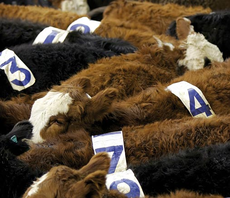‘Cows are the new coal’: Investor group urges governments to set clear emissions goals for agricultural sector


FAIRR group of investors warns of significant financial and environmental risks if ‘cow shaped hole’ at the heart of global decarbonisation efforts it not addressed
“Where’s the beef?” That is the question being asked today by a coalition of leading global investors with $5tr of assets under management, who have accused G20 governments of failing to come forward with detailed plans to tackle agricultural emissions and leaving investors exposed to escalating climate and stranded asset risks.
The FAIRR coalition, which includes high profile investors such as Legal and General and Canada Post Pension, has coordinated a statement under the banner‘Where’s the Beef’that has also been backed by former UN Secretary General Ban Ki-moon.
It highlights how despite the fact agriculture currently accounts for a third of all global emissions, none of the G20’s current national climate strategies submitted to the UN ahead of the COP26 Climate Summit include clear targets for curbing emissions from the farming sector.
In contrast, 50 per cent of the updated national climate strategies – known as Nationally Determined Contributions (NDCs) in the UN jargon – from G20 countries have targets for reducing energy sector emissions, while 20 per cent have specific decarbonisation targets for the transport sector.
As G20 finance ministers prepare to discuss the climate in Venice next month, FAIRR is calling for action to close the “cow-shaped hole” in current global climate plans, with the coalition highlighting how a lack of clear national targets and policies is undermining climate action from agriculture firms.
The group said one third of the world’s 60 largest animal protein producers’ reported an increase in emissions in 2019. A growing band of investors are increasingly concerned that a failure to tackle emissions from the farming sector could result in significant climate-related risks for investors in the form of both physical impacts such as droughts and flooding and transition-related risks if government’s realise they need to move quickly to tackle agricultural emissions. For example, analysis has shown that 40 of the world’s largest meat firmsface losses of up to $11bn from potential carbon taxation.
Jeremy Coller, chair of FAIRR and chief investment officer of Coller Capital, said a failure by governments and the agricultural industry could result in significant stranded asset risks. “Cows are the new coal,” he said. “Governments have the opportunity to show leadership and be transparent about how much of their climate pledges will be ring fenced as coming from agriculture. Capital markets need that data. Reducing emissions without a roadmap for how to get there is not only ineffective but highly damaging for investors and companies keen to ensure a fair and equitable transition to a net zero economy.
His comments were echoed by Ban Ki-moon, former Secretary-General of the UN and one of the architects of the 2015 Paris Agreement, who warned that “if we are to meet the goals of the Paris Agreement, countries must also say how they will tackle the high level of emissions from the agricultural sector as part of their national climate commitments”.
“Transparent emission reduction targets will help investors and wider stakeholders measure progress towards net zero and chart the transition to more sustainable agriculture,” he added. “Governments must work with farmers to build a sustainable and climate-smart agricultural sector that safeguards the livelihoods and communities that rely on farming around the world.”
The campaign is likely to be welcomed by green groups, but any calls for more ambitious agricultural decarbonisation strategies have tended to prove controversial with governments.
In the UK the Climate Change Committee has called on the government to set out how it could curb emissions from farming, including through reduced levels of red meat consumption. But Ministers have been quick to reject proposals from campaigners for a ‘meat tax’ to encourage a shift towards lower carbon diets and are yet to set out a detailed strategy for ensuring the farming sector delivers on its net zero emissions goals.








